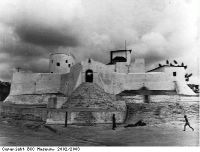Akwaaba in Ghana, Gate (Get) to Africa!
This blog is about my first year in sub-Saharan Africa and my internship with Oxfam Great Britain in Ghana.
Saturday, December 31, 2005
Friday, December 30, 2005
Bristol-Ghana: What's the Link?
There's at least one thing linking Bristol, the English city where I almost spent one and a half year, and the country Ghana where I'm going now. The two entities carried out slave trade between their ports. From the first one ships, loaded with cotton, brass pans and guns (1), were leaving for Africa; from the second one African people were taken to the Caribbean plantations for work (2). This form of trade became known as 'Triangular Trade' (3). England was not the only country involved. Spain, Portugal, the Netherlands and France took an important part (4).
Nor Bristol was the only British port city to play a role in the transatlantic trade. London, that Bristol overtook in the 1730s, was leading in the 17th century; Liverpool overtook Bristol in the 1740s. Many port towns around Britain also joined in. Some ports didn't send cargoes to Africa but America. For example, Bridgewater and Minehead in Somerset exported herring fish to the Caribbean Islands, such as Jamaica, to feed the plantation slaves. Other places than ports were involved such as Bath, Birmingham and Manchester. (5)
Slavery existed before in Africa but Africans usually enslaved 'other' people (prisoners of war, in payment for debt or as punishment for crime), not their own particular ethnic, or cultural, group. This enslavement was usually on a small scale. It was enough to supply the demand for slaves within Africa, but not enough to supply the European demand. As the demand from outside increased with the need of workforce for the plantations, there were warfare and raids to get slaves and more kidnapping of individuals. (6)
In 1979, the Unesco inscribed on the World Heritage List forts and castles (see pictures), erected between 1482 and 1786 along the Ghanaian coast - where Accra is (7). They are remains of fortified trading-posts where enslaved Africans were kept before their deportation (8).
The travel could last until eighteen months. Many Africans died during the journey for diverse reasons (9). According to the Unesco website (10), it is estimated that between 25 to 30 million people were deported. This figure excludes the number of deaths.
I will try to find out more about slave trade in Ghana when I'm on the spot. If I pursue my journey further, I might follow the route to the Caribbean Islands.
(1) http://www.discoveringbristol.org.uk/showNarrative.php?narId=9&nacId=11
(2) http://www.unesco.org/culture/dialogue/slave/images/Apdf.PDF
(3) http://www.discoveringbristol.org.uk/showNarrative.php?narId=9
(4) http://portal.unesco.org/culture/en/ev.php-URL_ID=27111&URL_DO=DO_TOPIC&URL_SECTION=201.html
(5) http://www.discoveringbristol.org.uk/showNarrative.php?narId=108
(6) http://www.discoveringbristol.org.uk/showNarrative.php?narId=159&nacId=161
(7) http://whc.unesco.org/en/list/34
(8) http://www.discoveringbristol.org.uk/showImageDetails.php?img_id=359
(9) http://www.discoveringbristol.org.uk/showNarrative.php?narId=15
(10) http://portal.unesco.org/culture/en/ev.php-URL_ID=27111&URL_DO=DO_TOPIC&URL_SECTION=201.html
Thursday, December 29, 2005
Un Pays de Contrastes?
Quels renseignements peut-on trouver sur le Ghana en Belgique? Le pays semble peu connu ici en raison d'une absence de lien historique entre les deux entités. Le Ghana est une ancienne colonie britannique, mais d'autres puissances (Portugais, Hollandais...) sont passées par là, attirées par l'or - le Ghana était d'ailleurs nommé Gold Coast ou Côte d'Or.
Un point commun rapproche le Ghana et la Belgique: le chocolat. En effet, le Ghana est grand exportateur de cacao. Oxfam commercialise une version équitable de cacao ghanéen, allié à du sucre de canne costaricain. J'ai goûté le produit et j'en ai repris depuis!
Des ressources internet, limitées, existent sur le Ghana. Ainsi, Wikipédia y consacre une présentation plutôt complète, bon point de départ pour le voyageur: http://fr.wikipedia.org/wiki/Ghana#Politique
Dans le même style, mais certainement plus approfondi, le site de la CIA, 'The World Factbook' offre des informations sur tous les pays du monde. Vous pourrez apprendre aussi sur la Belgique.
http://www.cia.gov/cia/publications/factbook/geos/gh.html#Issues
Il n'y a qu'à rechercher le mot 'Ghana' sur Google pour obtenir divers résultats de liens pouvant fournir des indications. En parcourant le site web officiel de la République du Ghana, force est de constater la dépendance du pays envers l'aide internationale qu'elle provienne des institutions financières internationales telle que la Banque Mondiale, des Nations Unies, etc.
http://www.ghana.gov.gh/index.php
En faisant un tour du côté de la presse ghanéenne en ligne, j'ai pu m'apercevoir d'une certaine liberté d'expression et d'opinion. Les médias que j'ai consultés critiquaient, pour la plupart, le gouvernement en place, dans sa façon de gérer le pays, l'accusant notamment de fraude lors des dernières élections de 2004.
A mon contentement, le peu d'informations disponibles sur le Ghana m'a livré un portrait contrasté. Celui d'un territoire riche en ressources naturelles (comme tout pays africain semble-t-il) gangréné par la corruption (comme beaucoup d'Etats dès qu'il y a des enjeux financiers, mais dans le cas africain, au détriment d'une large partie de la population). Il restera, en conclusion, tout à découvrir lorsque mon avion viendra d'atterrir.
Wednesday, December 28, 2005
The Great News!
It arrived on 11 November 2005. Prosper (my contact in Ghana) announced that Oxfam GB will engage me as an intern for a year (renewable). As mentioned before (see 'How Everything Started'), I will be Communication and Media Volunteer. I learnt on 4 November that they had taken a decision at the country level but had to wait for the approval by the Regional Programme Manager.
The email indicated the terms on which I will be engaged. I will receive a monthly allowance of 3,300,000 cedis, the equivalent of £200 (or 300 euros). That should allow me to live normally. I will have a single room self-contained accommodation within the official residence of the Country Programme Manager in Accra. An attached file 'job profile' explains the functions I will carry out. There are many responsibilities. I think the best way to know precisely the content and scale of my tasks is to find out on the spot.
What I can already talk about is the job's dimensions. The programme I will work for is called Trade and Right To Be Heard. It aims to provide a voice for marginalised to demand right policies and practices leading to a sustainable change in their lives. It includes advocacy, lobbying and campaign. No doubt that the programme is ambitious and I prefer to go there with no prejudice but an open mind. Because you can not expect only one specific aspect from such an experience but many things, very positive ones and negative ones obviously...
To find out more about Oxfam's work in Ghana, you can visit Oxfam's website ww.oxfam.org.uk and choose Ghana in 'Where we work'.
How Everything Started
I wouldn't have had this opportunity with Oxfam GB if Ray Pownall, Manager at an Oxfam bookshop in Bristol (where I worked as a volunteer while studying my Masters) had not given me the email address of Prosper from Ghana who visited the shop and works for Oxfam. Of course, I had never thought of Ghana as a potential destination (I even wonder if I knew that it existed!).
I sent Prosper an email where I asked for advice to obtain a job or an internship as well as preferably an experience in a Subsaharan country. That was not long after my return from Bristol in September 2005.
On the same day, Prosper replied and asked me to send him my CV that he could pass on to Oxfam's partners. He also wanted to know whether I wanted a paid internship or not.
No wonder that my response ("I am not looking for a paid internship in particular but hope that my accommodation and food would be provided") played a key role in Prosper's feedback: "I wish to indicate to you that Oxfam GB Country Programme in Ghana has expressed the interest in engaging you as an intern". However, there was still quite a long way to go as Prosper also indicated that this was subject to the availability of funds and my own expectations.
I had to wait for a definitive answer from them. Nevertheless, on my side, I started looking for funds such as grants. Above all, I carried out temporary jobs when I realised that I couldn't expect any financial aid by any means in Belgium!




